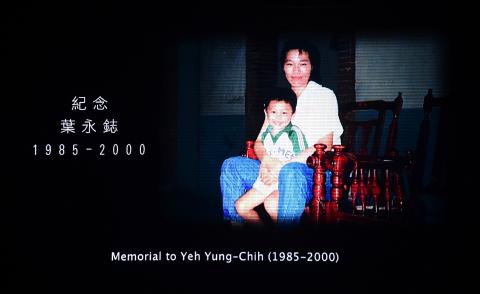Last Friday’s release of the dance video for Jolin Tsai’s (蔡依林) Womxnly (玫瑰少年) — the latest single off her fourteenth album Ugly Beauty (怪美的) — cracked open the song’s significance for a singer long regarded as a gay icon and ally.
The single’s Chinese title, which literally means “Rose Boy,” was the term of endearment for Yeh Yung-chih (葉永鋕), whose death in Apr. 20, 2000 at the age of 15 received national attention.
Prior to his death, Yeh was bullied at school for his perceived effeminate behavior. To avoid harassment, he would use the toilet just before breaktimes, when other students were still in class. When Yeh was found lying in a pool of blood in the toilet of his junior high school in Pingtung County, authorities concluded that a medical condition had caused him to slip and hit his head.

Photo: CNA
Yeh’s mother was critical of the outcome of the investigation and became an LGBTQ advocate. With growing clamor over the circumstances that led to Yeh being alone in the toilet in the first place, the government recalibrated its efforts to understand gender nonconformity and eliminate school bullying.
In December 2000, the Ministry of Education renamed its Gender Equity Education Committee (性別平等教育委員會), reflecting a substantive shift away from a gender binary framework to a more holistic understanding of gender. In June 2004, the Gender Equity Education Act (性別平等教育法) came into force.
The impact of Yeh’s life and death has had years to permeate through Tsai’s artistry, going back to her decision to screen a five-minute documentary featuring Yeh’s mother during her 2015 concert series. It is telling that Womxnly is the only track on Ugly Beauty where Tsai is credited as lead writer. Her lyrics are equal part earnest comfort (“Boy or girl, you can be whichever you want”) and sass (“A life in rosy hues shall be / The cold dish of revenge we serve the haters”) arranged over a very danceable electronic beat.

Photo: Pan Shao-tang, Liberty Times
New Zealand choreographer Kiel Tutin leads Tsai and her dancers through clever costume changes and contrasting facial expressions to embody an individual breaking out of society’s constraints into self-acceptance.
“The song says that regardless of gender, there is no established framework for gender identity,” Tutin wrote on Instagram.
Tsai has never relegated her support for the LGBTQ community to subtext. Most controversially, she and actress Ruby Lin (林心如) played a same-sex couple in the video for her 2014 single We’re All Different, Yet the Same (不一樣又怎樣). In less trustworthy hands, casting two apparently heterosexual women in that role would be criticized as lesbian-baiting. But Tsai only endeared herself to the LGBTQ community with the video’s storyline, which humanized the struggles faced by same-sex partners whose unions are not legally recognized.
It is rare, even in countries with robust civic discourse on human rights and identity politics, for mainstream interpretations of LGBTQ rights to be done well and with respect. Tsai is proving to be a virtuoso, down to the very progressive spelling of Womxnly, a term designed to include marginalized and intersectional groups such as trans women.

Towering high above Taiwan’s capital city at 508 meters, Taipei 101 dominates the skyline. The earthquake-proof skyscraper of steel and glass has captured the imagination of professional rock climber Alex Honnold for more than a decade. Tomorrow morning, he will climb it in his signature free solo style — without ropes or protective equipment. And Netflix will broadcast it — live. The event’s announcement has drawn both excitement and trepidation, as well as some concerns over the ethical implications of attempting such a high-risk endeavor on live broadcast. Many have questioned Honnold’s desire to continues his free-solo climbs now that he’s a

As Taiwan’s second most populous city, Taichung looms large in the electoral map. Taiwanese political commentators describe it — along with neighboring Changhua County — as Taiwan’s “swing states” (搖擺州), which is a curious direct borrowing from American election terminology. In the early post-Martial Law era, Taichung was referred to as a “desert of democracy” because while the Democratic Progressive Party (DPP) was winning elections in the north and south, Taichung remained staunchly loyal to the Chinese Nationalist Party (KMT). That changed over time, but in both Changhua and Taichung, the DPP still suffers from a “one-term curse,” with the

Jan. 26 to Feb. 1 Nearly 90 years after it was last recorded, the Basay language was taught in a classroom for the first time in September last year. Over the following three months, students learned its sounds along with the customs and folktales of the Ketagalan people, who once spoke it across northern Taiwan. Although each Ketagalan settlement had its own language, Basay functioned as a common trade language. By the late 19th century, it had largely fallen out of daily use as speakers shifted to Hoklo (commonly known as Taiwanese), surviving only in fragments remembered by the elderly. In

William Liu (劉家君) moved to Kaohsiung from Nantou to live with his boyfriend Reg Hong (洪嘉佑). “In Nantou, people do not support gay rights at all and never even talk about it. Living here made me optimistic and made me realize how much I can express myself,” Liu tells the Taipei Times. Hong and his friend Cony Hsieh (謝昀希) are both active in several LGBT groups and organizations in Kaohsiung. They were among the people behind the city’s 16th Pride event in November last year, which gathered over 35,000 people. Along with others, they clearly see Kaohsiung as the nexus of LGBT rights.